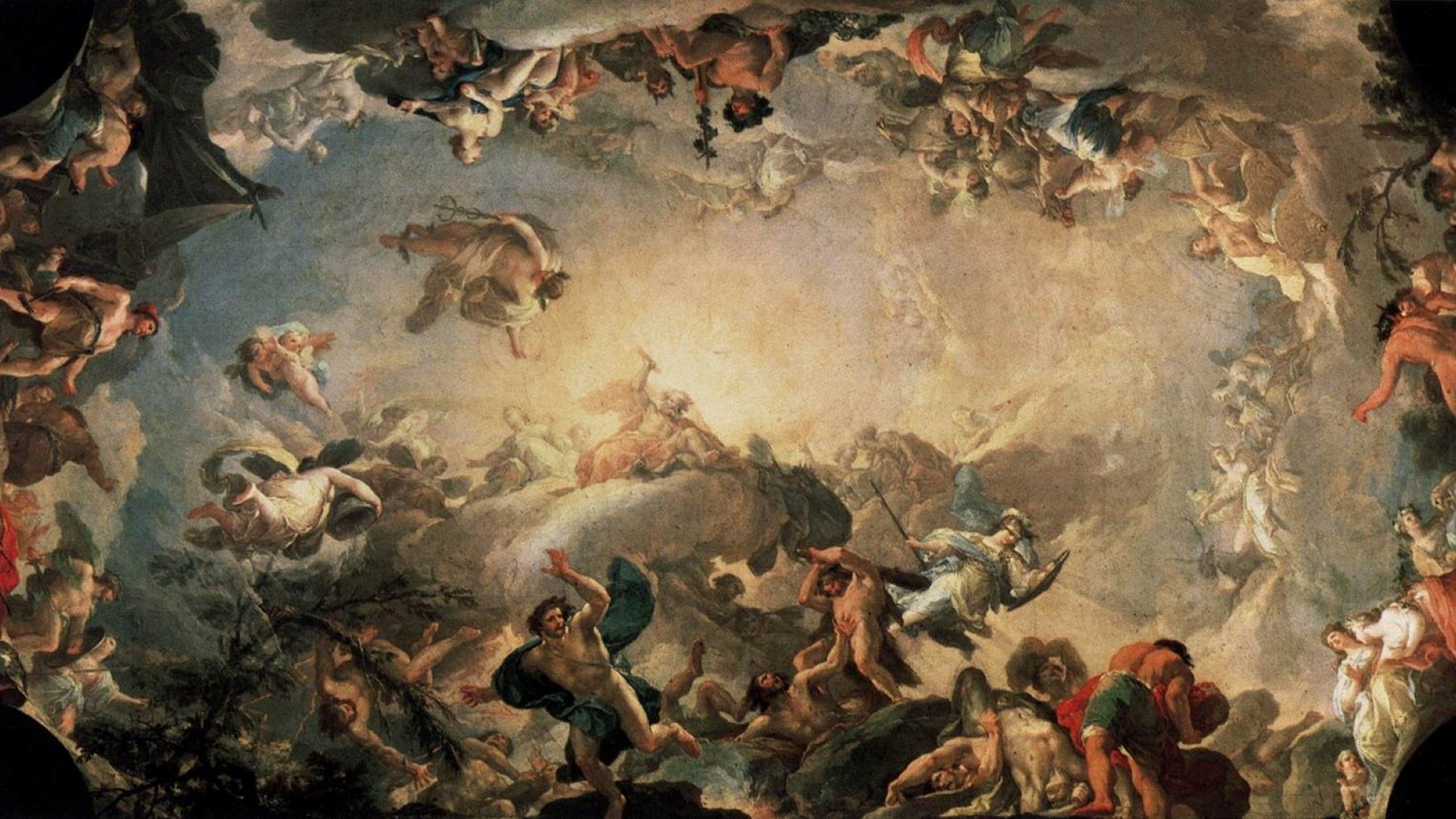
Thales of Miletus (c. 624 BC - c. 546 BC)

Thales of Miletus is considered to have been the founder of the Ionian School of philosophy.
Considered the first known scientist according to the accepted European definition of the word.
Thales of Miletus lived in Ancient Greece. He was the first scientist in history.
Thales looked for patterns in nature to explain the way the world worked rather than believing that everything happened only because one of the Greek gods had commanded it. He replaced superstitions with science.
He was the first person to use deductive logic to find new results in geometry and, through requiring proof of theorems, took mathematics to a new, higher level.
What we know of him was generally written hundreds of years after he lived, by Aristotle for example.

When pronouncing his name, we say thail-eez, emphasizing the first syllable.
There may have been other scientists before Thales, but if there were, we do not know their names.
Early Life and Education
Thales was born into a privileged family in the ancient Greek city of Miletus in about the year 624 BC. His father’s name was Examyes and his mother’s name was Cleobuline. He was born in the same era as Aesop, famous for his fables.
When Thales was born, Miletus was one of the wealthiest and most powerful of all the Greek cities. Today it is located on the coast of Turkey.
Thales was born into a Greek society which was intellectually less advanced than those to its east and south – the Babylonians and the Ancient Egyptians for example. The Babylonians were masterful astronomers and mathematicians, while the Egyptians were also far ahead of the Greeks in these fields.
In Egypt and Babylon, mathematics was used in commerce, astronomy and construction projects. It was a thoroughly practical science. Astronomy was used to study the heavens to understand what the gods might be thinking.
As a young man Thales became a merchant, which was probably his family’s line of business.
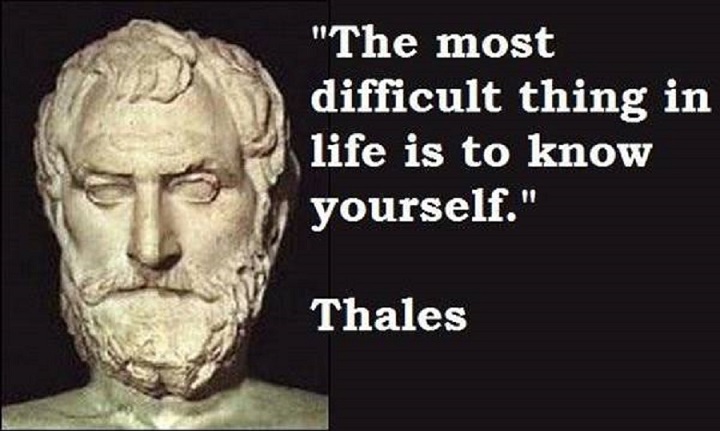
In his later years Thales traveled to Egypt, where he learned about astronomy and mathematics. He may have traveled to Babylon; if he did, it would have been during the reign of Nebuchadnezzar.
When Thales returned to Miletus he changed careers, took a big drop in income, and became Ancient Greece’s first scientist.
Thales: The Science
At some point, after he returned to Miletus, Thales took a step beyond his teachers. (Of course, his teachers may have taken this step themselves, but if they did, there is no historical record of it.)
In Egypt the annual rise in the River Nile’s level was vital for the success of the Kingdom’s harvests. Every year the silty river would rise and replenish the land around it with nutrients and moisture. The river would then fall and Egyptians would farm the newly fertile land. Without the Nile there could be no Kingdom of Egypt, because rain hardly ever fell there.
The Egyptians believed the Nile’s floods were caused by Hapi, one of their many gods. If the gods were displeased, the river would not flood, and there would be famine. The gods had to be kept happy at all costs.
Nowadays, of course, we know the Nile floods because of seasonal rains that fall further south in Africa: in fact it was another Ancient Greek, Eratosthenes, who was the first to figure this out, although Thales himself seems to have speculated about the true cause.
The switch between believing that the gods were responsible for day-to-day events and believing that if we understood natural phenomena we could actually explain and predict events was Thales’ greatest achievement.
It unleashed people's ability to think about the underlying causes of what we observe. It was the first scientific thinking that we know of: Thales was the man who dumped superstition in favor of science.
A nerd with his head in the clouds who grew rich!
One dark evening Thales was out walking in Miletus, looking at the night sky. He stumbled into a ditch, whereupon an old woman, who knew him as a ‘thinker’ laughed, and asked: “How can you see what the heavens are telling you when you can’t even see what is under your own feet?”
Thales seems to have been Ancient Greece’s first ever academic – its first science nerd in fact! And he was mocked for it. In the wealthy city of Miletus people told Thales that no one could ever prosper from merely thinking, and that’s why he was not rich.
Thales, however, proved his detractors wrong. He decided to show them that he could use his science to make money.
He had studied weather patterns in the region of Ionia, where the city of Miletus was located. One winter, he realized that the next season’s olive harvest would be a bumper crop. While it was still winter he placed small deposits to hire all of the olive presses in Miletus for the next harvest. In summer, when the olive growers began to realize that a huge crop of olives was coming, they discovered that Thales had already hired all of the olive presses. Thales made a fortune by selling his rights to the olive presses to the olive growers.
In becoming wealthy in this way Thales carried out no physical work. He grew rich by applying his observations of weather patterns to predict how big the olive crop would be. He did not need any help from Aristaeus, the Greek god of olive groves.
Earthquakes
Ancient people believed earthquakes were a measure of their gods’ anger. Sacrifices, including human sacrifices in some cultures, became the normal way of trying to pacify angry gods.
Thales sought a rational explanation for earthquakes. He theorized that our whole planet Earth is a flat disk floating on an infinite sea of water and that earthquakes come when the planet is hit by a wave traveling through the water. With the benefit of modern science we know that Thales got it wrong.
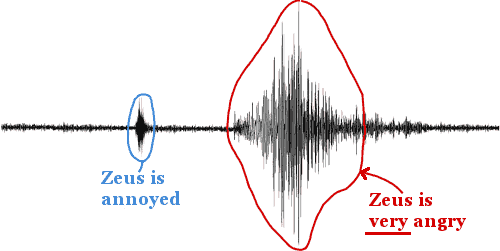
(Ancient people believed earthquakes were a measure of their gods’ anger.)
His theory was, however, an enormous advance on saying that the earth shook because Zeus was annoyed about something. Thales had at least tried to find a rational explanation for earthquakes.
A further benefit of Thales’ ideas (mercifully) was that they required no sacrifices to be made.
What Are Things Made Of?
Thales thought deeply about matter. He decided that, fundamentally, everything must be made of the same thing – much as today we believe that all matter is made of atoms. His idea was that in its most fundamental form, all matter is water. In fact, it only took about 200 years for Thales’ idea that “all matter is water” to be transformed by his later compatriot Democritus into “all matter is atoms.”
The Ancient Greek historian Plutarch, who lived 600 years after Thales died, wrote that Egyptian priests claimed that Thales’ “everything is water” theory originally came out of Egypt.
Astronomy
Thales learned about astronomy in Egypt and possibly Babylon.
When Archimedes was killed during the Roman conquest of Syracuse in 212 BC, the Roman historian Cicero wrote about the event.
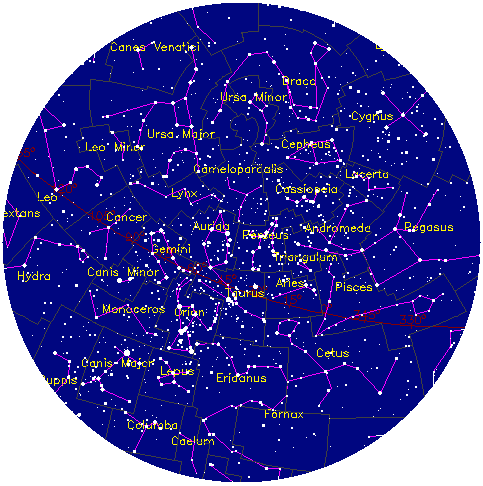
(Thales built a sphere showing the planets and stars in their constellations around Earth. Later Greeks – possibly Archimedes – developed this further and built a remarkably sophisticated heavenly calculator – the Antikythera Mechanism.)
The Romans discovered that Archimedes had a machine that accurately predicted the movement of the moon and planets and predicted solar and lunar eclipses. (Such a machine has actually been found by archeologists – it is an amazingly sophisticated device called the Antikythera Mechanism.)
The Romans also found a more basic globe showing the celestial sphere – a forerunner of the Antikythera Mechanism – which had first been made by Thales.
Groundbreaking Mathematics
As with astronomy, Thales learned about mathematics in Egypt and possibly Babylon.
Back in Miletus, he built on what he had learned and was the first person to use deductive logic in mathematics, producing new results in geometry.
He established for the first time that mathematical theorems require to be proved before they are accepted as true.
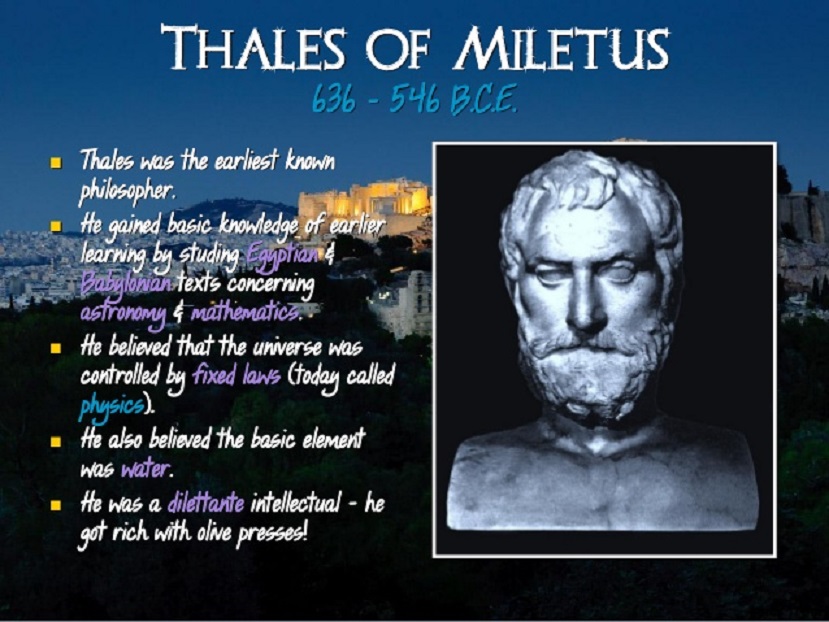
He began the transformation of mathematics from a practical, applied field of study to one that could be investigated and explored without any concern for the practical uses of the results.
In these ways Thales took great leaps towards modern pure mathematics, a subject which is based upon deduction and proof and is not concerned with practical uses for its findings. (Funnily enough, although pure mathematics is performed with no thought given to practical uses, discoveries in pure mathematics often turn out to be important in the real world!)
Thales established the Milesian School, where he taught mathematics, setting the stage for mathematics to flourish in Ancient Greece.
Belief in Gods
Thales did not reject the gods. He believed the gods were present in everything. As a result of this, all matter had some aspect of life in it. He thought that by understanding the fundamental principles of nature, people would actually get to know and understand their gods better.
Legacy
Thales was the founder of science in Ancient Greece. He established the Milesian School, which passed on his knowledge, most notably to Anaximander and Pythagoras. Greek science and mathematics peaked about 300 years later, in the era of Archimedes.
The rediscovery of Ancient Greek science and mathematics was the spark that fired the Renaissance and Scientific Revolution in Europe, which set science on the course leading ultimately to where it is now.
The rejection of superstition in favor of science began with Thales.
Family Life and The End
Accounts from ancient historians disagree about whether Thales ever married. Some say he married and had a son. Others say that he did not marry, but treated one of his nephews as if he were his son.
Thales died aged about 78 in about the year 546 BC.
[1]
Sources
Our Mobile Application
Check out Our Mobile Application "Ancient Greece Reloaded"


